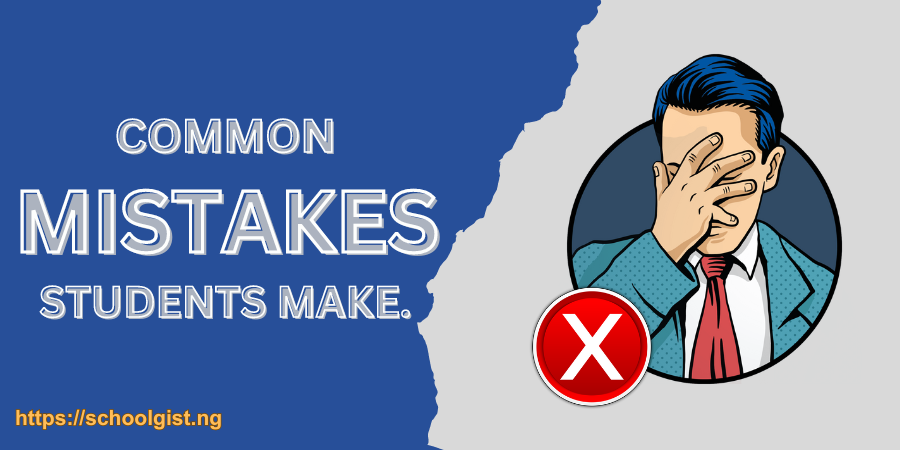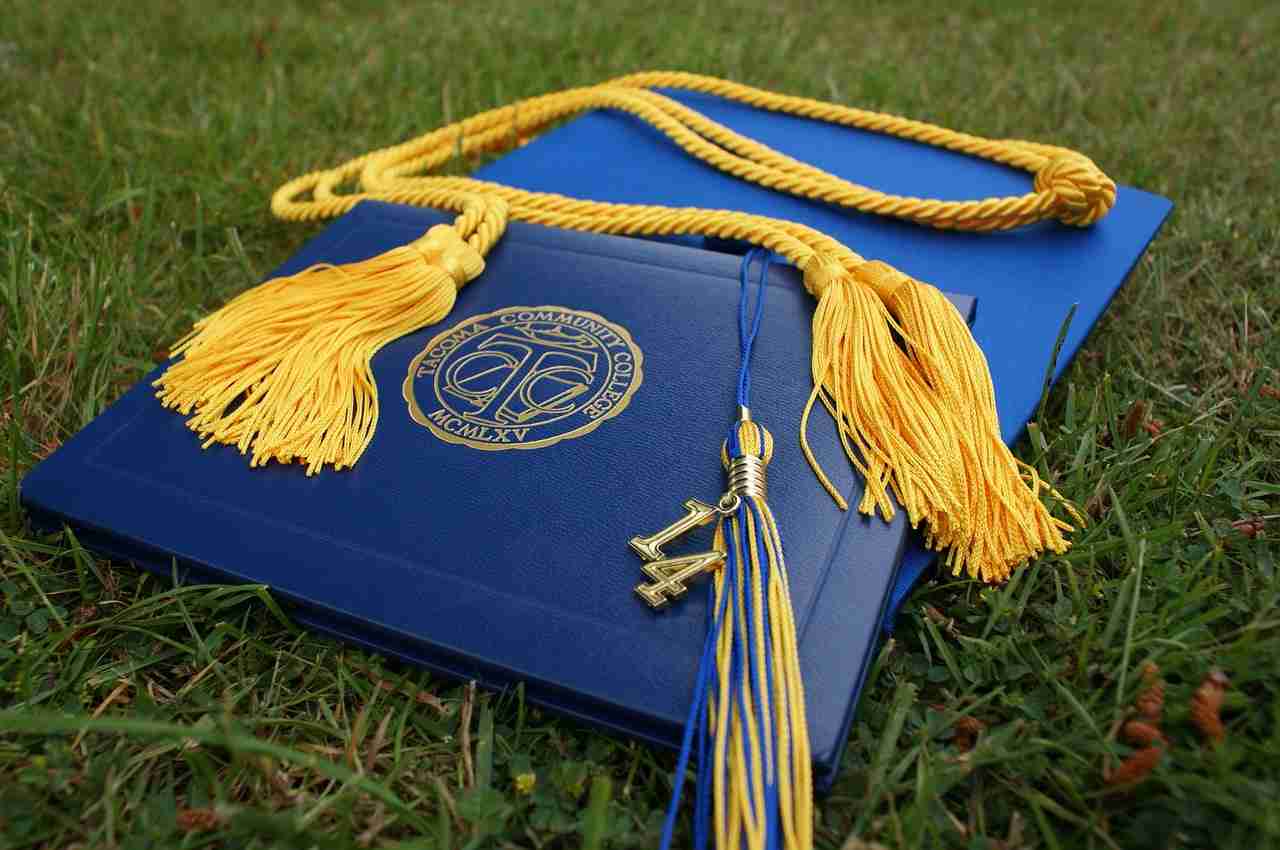
Since the origin of man, education (both formal and informal education) has always been a crucial aspect of personal and professional development. For students, the choices they make during their academic journey can significantly impact their future. In Nigeria, as in many other countries, students often encounter challenges that hinder their academic success. In this article, we will be discussing 15 common mistakes students make and how to prevent these mistakes, based on various aspects of their academic and personal lives.
15 Common Mistakes Students Make
- Not Starting Early Enough
- Not Taking Advantage of AI Softwares
- Not Looking for Sources of Income while in School
- Relying on Teachers to Prepare Them for Exams
- Only Re-reading Their Notes for Exam Revision
- Skipping Breakfast
- Cramming for Exams
- Not Getting Enough Sleep
- Procrastination
- Not Getting Involved
- Getting Over-Involved
- Skipping Class
- Failing to Prepare for Class
- Failing to Do Homework/Assignments
- Cheating
1. Not Starting Early Enough ::
One of the most common mistakes students make is not starting to build their academic foundation/grade (CGPA) from their year-one in school. Some students believe that they still have enough time to get serious about their studies and only start focusing on their CGPA from the later years. But the fact is this, "The grade of your year-one result (CGPA) set the tone for the rest of your academic journey."
How to prevent this mistake: As a student, you should approach your studies seriously from the beginning, attending classes regularly, forming study habits, and seeking help when needed.
2. Not Taking Advantage of Artificial Intelligence (AI) Tools ::
In today's digital age, the failure to leverage AI software tools for learning is a missed opportunity. AI tools can significantly enhance the learning process, providing personalized study materials, facilitating research, and offering innovative ways to understand complex concepts.
How to prevent this mistake: Students should embrace the Best AI Tools for Students, as well as other AI technologies in order to enhance their study methods. As a student, you should use these AI-driven resources for research, organization, and exam preparation.
3. Not Looking for Sources of Income while in School ::
Being financially independent is important for students, and not seeking sources of income while in school can lead to unnecessary financial stress. Engaging in part-time jobs or internships can provide valuable experience and help students manage their finances responsibly.
How to prevent this mistake: Students should actively seek opportunities for part-time work or internships related to their field of study. Such work opportunities should present the student with the ability to balance Work Commitments with Academic Responsibilities. Inline with this, we have carefully compiled a guide on How to Make Money as a Student.
4. Relying on Teachers to Prepare Them for Exams ::
While teachers play a crucial role in guiding students, it is essential for students to take responsibility for their own learning. Relying solely on teachers to prepare for exams may lead to gaps in knowledge and understanding.
How to prevent this mistake: Students should take responsibility for their education, engage in active learning methods, and seek additional resources to supplement classroom instruction.
5. Only Re-reading Their Notes for Exam Revision ::
As a student, re-reading only your class notes is a passive form of studying, which has proven to be less effective than active engagement. Effective revision involves active engagement, such as practicing with past questions, discussing concepts with peers, and applying knowledge to real-life scenarios.
How to prevent this mistake: Students should adopt active study techniques, such as practicing with past papers, teaching concepts to peers, and applying knowledge to practical scenarios.
6. Skipping Breakfast ::
Neglecting the importance of breakfast can negatively impact a student's cognitive function and overall well-being. Skipping this meal can lead to fatigue, reduced concentration, and a negative impact on academic performance.
How to prevent this mistake: As a student, you should prioritize a nutritious breakfast, incorporating foods rich in protein, whole grains, and fruits to fuel your body and mind for the whole day.
7. Cramming for Exams ::
Cramming information at the last minute is an ineffective study strategy. It often results in a shallow understanding of the material, making it challenging to retain information in the long term.
How to prevent this mistake: Students should adopt a study schedule well in advance, breaking down topics into manageable portions and reviewing regularly to ensure better comprehension.
8. Not Getting Enough Sleep ::
Adequate sleep is crucial for cognitive function, memory consolidation, and overall health. Students who consistently sacrifice sleep may experience fatigue, reduced concentration, poor academic performance, and poor mental health.
How to prevent this mistake: As a student, you should prioritize a consistent sleep schedule, aiming for 7-9 hours of quality sleep each night to support optimal cognitive function.
9. Procrastination ::
Leaving tasks until the last minute is one of the common mistakes students do. Procrastination can lead to increased stress, rushed work, missed deadlines, compromised quality of work, and missed opportunities for improvement. It also negatively affects the development of effective time management skills.
How to prevent this mistake: It's advisable for students to break tasks into smaller, manageable steps, set deadlines for each, and establish a routine that minimizes the temptation to procrastinate.
10. Not Getting Involved ::
Social engagement enhances personal growth, networking, and overall satisfaction with the college experience. Isolation can lead to feelings of loneliness and hinder academic success.
How to prevent this mistake: Students should actively participate in departmental groups, clubs, and other extracurricular activities to broaden their perspectives and build a network of friends and mentors.
11. Getting Over-Involved ::
While involvement in extracurricular activities is essential, students should strike a balance. Overcommitting to social activities can detract from academic priorities, causing a strain on overall performance.
How to prevent this mistake: Students should prioritize academic responsibilities, carefully selecting a manageable number of activities that align with their interests and goals.
12. Skipping Class ::
As a student, attending classes regularly is very important for understanding course content and staying updated with assignments. Skipping classes can result in missed opportunities for clarification and negatively impact grades.
How to prevent this mistake: Students should prioritize attending all classes, recognizing that each session contributes to a comprehensive understanding of the subject matter.
13. Failing to Prepare for Class ::
Coming to class unprepared can limit a student's ability to participate actively during the lecture. It also negatively affects the student's comprehension and his/her ability to grasp new concepts. Preparing beforehand shows commitment to the learning process.
How to prevent this mistake: Students should review materials before class, complete assigned readings, and actively participate in discussions to maximize their learning experience.
14. Failing to Do Homework/Assignments ::
Homework assignments, whether graded or not, are very important for reinforcing learning, providing opportunities for practice and application of theoretical concepts. Neglecting to complete homework can lead to gaps in understanding and lower overall academic performance.
How to prevent this mistake: Students should complete all assignments, whether graded or not, to solidify their understanding of the subject matter and demonstrate commitment to their studies.
15. Cheating ::
Engaging in academic dishonesty, such as cheating on exams or plagiarizing assignments, undermines the integrity of education. It not only jeopardizes academic success but also damages the reputation of the student and the educational institution.
How to prevent this mistake: Students should prioritize honesty and integrity, seeking help when needed and understanding that the pursuit of knowledge is more valuable than a fleeting grade obtained through dishonest means.
Summary ::
Addressing the common mistakes listed in this article requires a combination of self-awareness, discipline, and a proactive approach to academic and personal development. When these mistakes are avoided, it can significantly enhance a student's academic experience and contribute to long-term success. By prioritizing early engagement, embracing technology, and maintaining a balanced lifestyle, students can navigate their academic journey more effectively and build a strong foundation for their future endeavors.
As you make efforts to achieve academic excellence, all of us at SchoolGist.Ng wish you the best of lucks.




